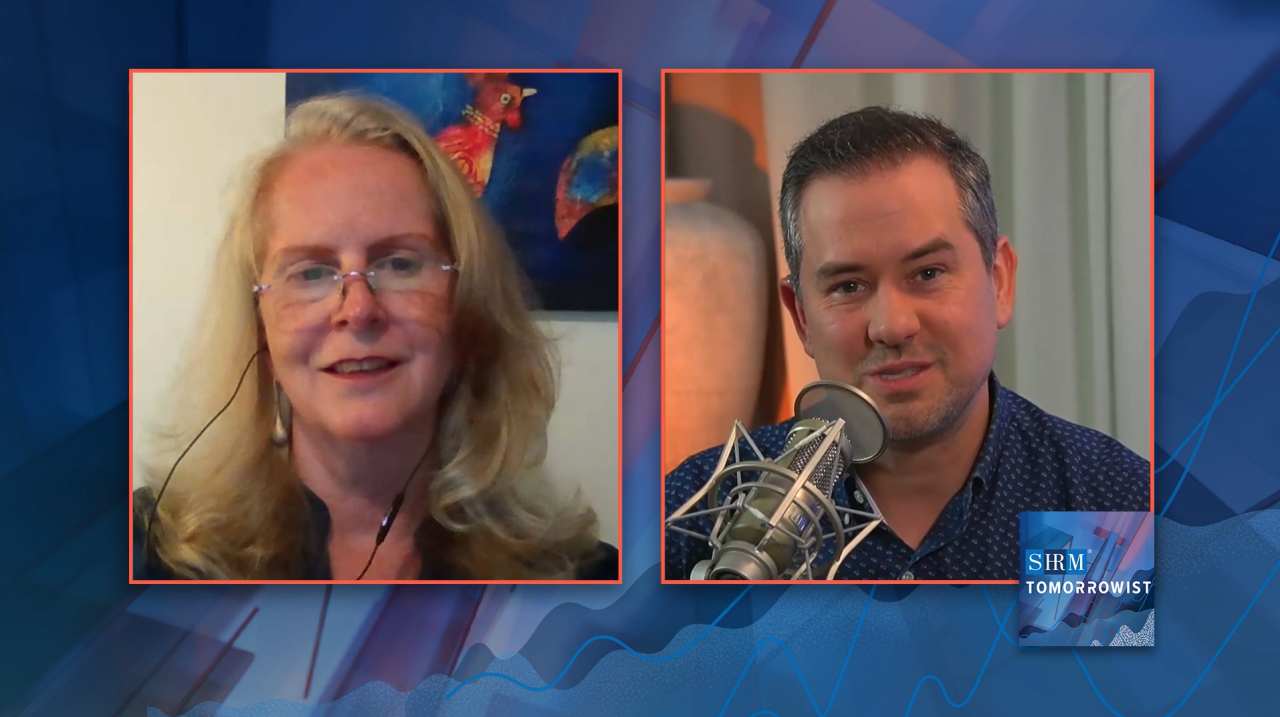Susie Alegre, an international lawyer and specialist in human rights law and technology, recently appeared on SHRM’s Tomorrowist podcast. A summary of that conversation appears below.
Tech giants such as Mark Zuckerberg, Elon Musk, Satya Nadella, and Sundar Pichai are household names, but is their influence over today’s workplaces becoming too powerful? As companies increasingly rely on a handful of large technology providers, how do executives—especially CTOs and CIOs—keep a healthy distance from Big Tech companies while utilizing the advancements they provide? Susie Alegre, Ph.D., an international lawyer specializing in technology policy, human rights, and ethics, believes that business leaders should approach this power imbalance with caution.
Alegre is concerned about society’s growing dependence on technology, both in personal and professional settings. “Whether you as an individual or as a business want to do banking, whether you want to see your doctor, whether you want to meet new friends, find a partner, all of these kind of things are now being mediated through technology in ways that we often don’t really understand,” says Alegre, author of Human Rights, Robot Wrongs (Atlantic Books, 2024). Warning that this reliance on Big Tech could lead to unforeseen risks for businesses, Alegre stresses the need for leaders to examine the ethical, social, and operational implications of this dependency—particularly when it comes to emerging technology, namely artificial intelligence.
How Executives Can Embrace Tech Responsibly
Could reliance on tech giants expose business operations to liabilities that corporate leaders cannot foresee? “Control over your ability to do business is something that you really need to be concerned about,” Alegre argues. “And then one of the areas of focus in the book as well is really looking at things like your environmental, social, and governance concerns. So, looking at what it means for you and the ethics of your company.”
Alegre points out the ethical and governance challenges that come with increased use of AI. She makes it clear that AI itself is not inherently bad or good, but human use certainly could be. That’s why business leaders need to be specific and clear about use cases. Alegre advises leaders to first ask a few questions before implementing AI. “How exactly is it going to help? Why is it better? What are the risks? What are the downsides? And what are the real benefits? Not just the benefits that the salesperson is telling you about,” she advises. Alegre says this nuanced approach to AI implementation, which weighs the benefits and risks, is vital to ensure executives aren’t swayed by the hype cycle of new technology.
Leaders, Alegre argues, should be cautious of the narrative that adopting AI is the only way to stay competitive. She gives the example of automated checkouts, noting that a U.K. supermarket chain moved away from automation after realizing that customers preferred human interaction. “People enjoy talking to people,” she says, pointing to the broader issue of how technology can diminish human connection in certain contexts.
The Impact of Technology on Employee Critical Thinking Skills
Alegre’s concerns extend to how an overreliance on tech in the workplace will affect employees. She warns that this dependency could weaken critical thinking skills—a key asset for any workforce. It’s up to leaders, she argues, to be mindful of how much autonomy and judgment they allow technology to replace within their teams.
According to Alegre, research shows heavy use of GPS technology reduces our natural spatial awareness. She suggests that overuse of technology in the workplace, if not strategically managed, could lead to a similar “de-skilling” effect in employees.
“Even if you started off with a great sense of direction, if you heavily use GPS, it’s likely that your brain will literally change its form in ways that means that you can’t orient yourself without GPS going forward,” Alegre warns. But does this apply to new technologies and AI? “There’s been some very recent research that seems to show similar effects of generative AI on students, although obviously ... it’s very, very new,” she cautions. “It remains to be seen how it will develop over time.”
Will Tech Dependency De-Skill the Workforce?
According to Alegre, new studies show that students entering the workforce are overly relying on AI—to the degree that some are using AI to obtain qualifications they didn’t truly earn. This potentially puts other employees at risk with staff that lack the proper experience to do their work. “[There are] people lining up with professional qualifications who actually do not have the professional knowledge or ability to do the job,” Alegre says. “I think, it’s going to be, really, the next level of challenges that we’re going to be facing.”
In a world where technology is rapidly advancing, Alegre advocates for a balanced, thoughtful approach to tech adoption, urging business leaders to scrutinize AI solutions carefully while considering the long-term implications for employees and customers. She warns, “First-mover advantage may well be a real disadvantage when the whole system fails.”
Was this resource helpful?




